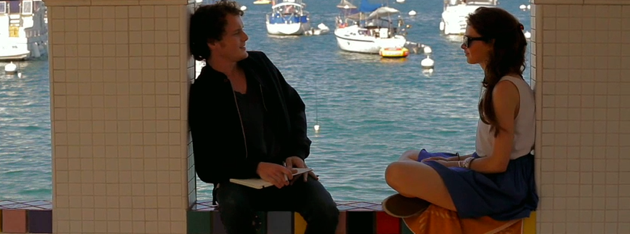Review: ‘Like Crazy’

When we see love stories in movies, there's an unspoken assumption that the onscreen couple should be together. Either they wind up in each other's arms or through some cruel twist of fate their love remains unrequited, torn apart by war or death or something equally momentous. This is rarely how it works out in real life, which is why people go to romantic movies: They reassure us that we all have that one special someone who's perfect for us. That's one of the reasons why I fell for "Like Crazy." It's a love story about two people who are convinced they're soul mates, even if the evidence suggests otherwise. Actually, it's not exactly a love story -- it's more like a heartbreaking cautionary tale.
"Like Crazy" won the Grand Jury Prize at Sundance this year, beating out other worthy films like "Higher Ground," "Martha Marcy May Marlene" and "Take Shelter," and on its surface it's a much less ambitious movie than those others. Jacob (Anton Yelchin) is an American college student living in Santa Monica who falls for a British classmate, Anna (Felicity Jones). They're about ready to graduate, and her visa is about to expire, so they decide to have a whirlwind romance before she has to go home ... except she impetuously decides that she'll stay a few extra months, which he does nothing to stop. But when she does eventually return to the U.K. and tries to reenter the U.S., she's barred by immigration, forcing the two young lovers to find a way to make their long-distance relationship work.
Directed and co-written by Drake Doremus, "Like Crazy" mirrors the fevered, melodramatic relationship it chronicles. There's no distance between Doremus and his characters: He wants to immerse you in the same sort of hyperbolic life-or-death agony that plagues Jacob and Anna as they fall in and out of love and decide if they're better off without one another. Unlike a movie such as "Before Sunrise" -- which gave the tempestuousness of young love a melancholy, philosophical bent -- "Like Crazy" just throws you into the deep end and expects you to start swimming alongside its characters.
Even more importantly, the film doesn't offer any judgment about the sometimes irrational (or outright stupid) behavior of the lovers. There are things in "Like Crazy" that Jacob and Anna do that will infuriate you -- her thoughtlessness about staying in the U.S. past her visa's expiration is a good place to start -- but I would argue that that's part of the movie's point. "Like Crazy" isn't trying to justify or rationalize their actions; it's trying to put you back into the mindset of what it was like to be that young, foolish and in love. And on that front, it succeeds terrifically.
Consequently, Yelchin and Jones have to walk a pretty delicate line. At first, it's Anna's forwardness and declarations of love that drive their relationship, but as time and distance start to take their toll, that dynamic begins to change. Minutely, "Like Crazy" illustrates how each character's behavior becomes a response to what he or she perceives in the other person. Neither character comes across as entirely heroic or laudable: They begin relationships with other characters -- memorably Yelchin with Jennifer Lawrence, his "Beaver" co-star -- that only extend the chain of heartache and neediness to more and more people. By all rights, you should find Jacob and Anna insufferable and their relationship little more than a passive-aggressive, codependent debacle. But thanks to Doremus and his expressive, unguarded actors, I felt for the characters while simultaneously recognizing that these two probably shouldn't be together. They're too immature. They're too focused on promising careers to really be selfless enough to make love work. And yet, they can't let each other go.
And that's where "Like Crazy" gets its weird pathos: You're watching characters who are so desperate to stay in each other's lives that they can't see the truth that's apparent to everyone watching them. They hurt each other terribly, but we know it's a reaction to a sense of betrayal they feel -- from the other person, as well as from this notion that everyone will find their soul mate. It's pretty easy to make a movie about two people destined for one another. It is far harder to make a movie about ones who aren't but who think they are. Even when "Like Crazy" was over, I couldn't tell you how things will end up for Jacob and Anna. But I have a feeling. And while I found myself shaking my head at some of the things they do, I felt like I understood. Eventually we all grow out of this phase. But it does happen for a lot of us, even if we don't want to admit it. But "Like Crazy" reminds us that, yes, it did.
Grade: A-

